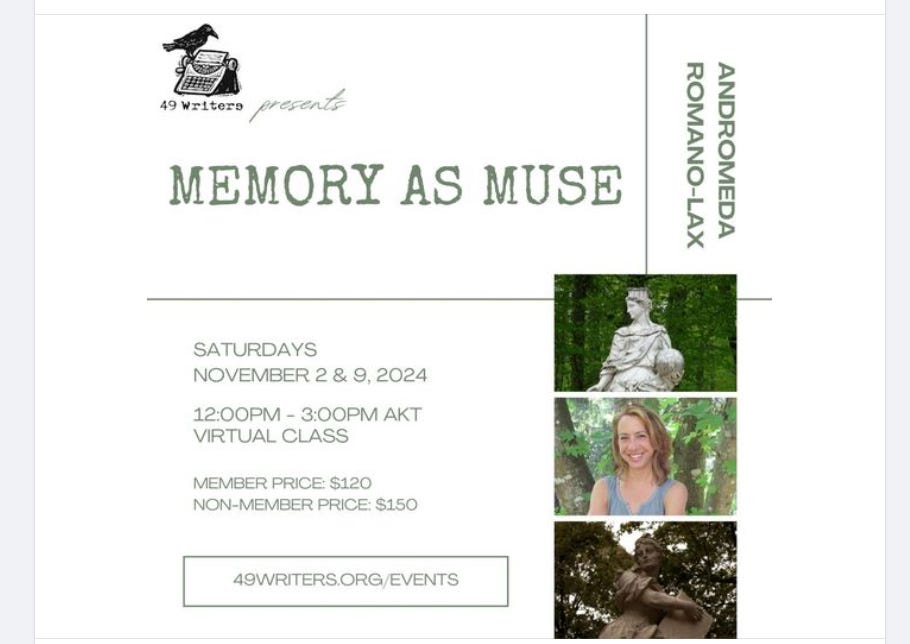Pressing the Re-set Button
Learning from a small mistake and applying it to writing and life, plus memory, coaching, and beautiful cello music by women composers
First: I’m teaching another two-session 49Writers class, and it’s all about memory, with some scientific backgrounding, literary inspiration (what is your “madeleine moment,” a la Proust?), and lots of easy writing prompts. All levels and genres welcome, whether you are a memoirist struggling to evoke the past or a fiction writer curious about using memory as a springboard. Details and registration here.
It’s fall! 🍂 My favorite time to write. Yours, too? Are you looking for a developmental editor for a full manuscript or a monthly book coach to help you with accountability and breaking through plateaus? I have spots open. My services are selective. More info at www.romanolax.com. Email me at aromanolax@gmail.com for more info. Also, take note. My husband Brian is developing a side hustle as a freelance copyeditor. Intriguing, isn’t it? I am studying over his shoulder because there is so much to learn about writing cleaner copy!
Readers of my 2007 debut novel, The Spanish Bow will know that it was my love of cello music that started me writing fiction in the first place. An unskilled cellist with a profound appreciation for other cellists, I immersed myself the best I way could, via archival research, travel, and finally writing about a Catalonian cellist modeled after Pablo Casals.
If you have an interest in cello music or the lives of forgotten women—two of my favorite topics!—please check out this new album, “Unspeakable Beauty: Works by Historical Women Composers” by my friend and Gabriola neighbor, cellist and composer Corbin Keep. It’s more than an album, it’s a stirring effort to bring new attention to forgotten musicians. The notes for each song are fascinating. Ready to go back almost a thousand years? Check out the first piece, Beatriz de Dia, a piece about betrayal in love written for solo voice and first published in 1175. The next song in the lineup is even older—a piece recreated from a lyre piece by Sappho, circa 500s BC! Free to listen here. His website has more info and a database of 256 women composers from ancient times through 1951, plus a growing number of scores.
Final shoutout to people doing cool things! Porphyry Press, founded by Jeremy Pataky is enlarging its list with two new forthcoming titles, by Erica Watson and Maya Jewell Zeller. If you’re an Alaska or circumpolar writer keeping an eye on indie Northern presses, take note.
And now for the race report.
The Re-set Button.
How did this happen? Why did this happen? What do I do now?
Just over two weeks ago, I glimpsed the finish line of my third Ironman event, a 70.3 (Half Ironman) in Richland. But instead of being thrilled to see the red carpet and all the cheering crowds, I knew I’d made a mistake.
By this point, I’d run about 1.5 miles. The running portion of a Half Ironman is 13.1 miles.
Everyone was shouting for me to keep going and accept high-fives as I made the final sprint. Instead, I stopped and looked around. I took a few steps left. I stepped right. The cheering spectators probably thought I’d lost my mind.
In some ways, I had. My heartrate was 170 bpm—nearing my maximum. I’d already been going at maximum effort for about four and a half hours (a 1.2-mile river swim followed by a hilly 56-mile bike, during which I had biked several miles per hour faster than I’d hoped to bike).

My brain was addled by the cardio effort and even more, by the heat. But my brain had enough sense to know I needed to turn around. My race wasn’t done. I had to run against the flow of the finishing runners—those fast folks who really had run their full 13 miles—and figure out where I’d made a wrong turn.
Seven minutes later, I came to the T-junction where I had turned right—heading for the finish—instead of left—heading for the main out-and-back route. It had happened, I now understood, when I came out of an outhouse that was set apart from the other outhouses. I had exited the off-path outhouse, accepted some ice to put under my hat from a volunteer, and then proceeded to run the wrong way, receiving no correction from the volunteer.
Where. How. Whose fault.
These were the thoughts still bouncing around my head minutes later. I kept reconstructing the steps that had led to choosing one outhouse, then going to another one farther away, then turning in the wrong direction.
Volunteer’s fault. My fault.
It doesn’t matter.
It was my responsibility to orient myself and go the right way. I’m overheating. I might have to DNF.1
Then I started worrying about Brian, who’d be watching me via the tracker app. From my pace, he might assume I’d dropped out. Or even passed out.
I don’t have a way to let him know I’m okay. This is not only going to worry him. It will ruin his day.
I reminded myself that he’d seen me in the T2 zone, coming off the bike, looking fine. I reminded myself that if I just kept running, at some point the tracker app would show an accurate current pace and he’d know I was okay.
Good. Stop worrying.
I hadn’t found my stride, but my brain had stopped trying to relive the mistake and figuring out what it had cost me.
I’d set aside the question of blame.
Re-set.
I’d stopped worrying about Brian.
Re-set.
I’d put the mistake into perspective and I’d pulled my attention back to the present moment, the only moment I could deal with.
Re-set.
The word was working like a mantra. Finally, I wasn’t dwelling or regretting any more. I was just thinking.
This is interesting.
That thought helped.
I can learn from this.
That thought helped, too.
I’ve spent years wanting to work on my mental resilience, especially when it comes to my work life. But until this moment, I hadn’t had a good definition of what I meant by that term.
I didn’t mean avoiding negative feelings, because I know that stuffing down the bad stuff only makes it stick around longer.
I didn’t mind mean responding with flexibility and positivity during major crises, because true crises—the really big ones—can’t be rushed through or navigated in advance.
So what did I mean?
I realized, only while running the next few miles, that I’d put too much thought over the years into big professional and life disappointments, and not enough thought into the small, everyday ones.
The times you get a stressful editorial email or read a negative reader review. The days you wake up and don’t want to write or suddenly doubt the direction a project has taken. That heavy-hearted feeling, worrying that you don’t have the stamina for another major revision. The momentary feelings of “that wasn’t fair” or “that shouldn’t have happened” or “why can’t I get a break?”
I thought about the everyday metaphors of how I re-set in small ways, both literally and metaphorically. By closing apps and swiping away open browser windows on my old phone. By pouring a fresh coffee. By putting on music. By leaving the house to do a quick errand and seeing nature along the way. By kvetching with a writer friend who understands. By taking a day to read instead of write.
As I kept running—and walking—for the next two hot, challenging hours, I had lots of time to think about:
· Times in my writing life when I’ve re-set slowly or quickly
· What helps me get over writing-related disappointments and move on
· What advice I can give my future self about re-setting
I never felt physically great on the run, but I did finish it, and surprisingly, I still managed to get a personal best or PR of 6:47.2
But even if I hadn’t made my goal, I knew—even before I saw the finish line, this time for real!—that I’d be even more proud for turning a race hiccup into a lesson.
I’m still thinking about it now.
How do we re-set and return to the current moment rather than ruminating about what went wrong?
For each of us, there is a sweet spot—a balance between allowing ourselves to dwell on and learn from disappointment without turning it into an overblown and potentially self-fulfilling story about failure.
We all need some time to brush ourselves up after a metaphorical fall. But then we get up again. Maybe a little more quickly than the last time? That’s my hope.
Have you found ways to press the re-set button or become more mentally resilient? I’d love to hear!
Andromeda
Thanks for reading From My Island to Yours: Andromeda's Adventures in Authoring! Subscribe for free to receive new posts and support my work.
DNF=”Did Not Finish.” Which is better than DNS=
”Did Not Start.” More metaphors for the writing life!
For the Ironcurious reading this, the max time for a 70.3 is usually 8.5 hours. My first half was 8 hours. I’d hoped to cut an hour from my time, and I did! But even temporary hubris is dangerous. Much depends on course, weather, and luck. It’s a lot like publishing, especially that damn luck part!!!





This is great! I’m fascinated by the fact, that at least for myself, my great epiphanies happen in the midst of challenging physical adventure. It’s as though being physically maxed out takes the brain to a new place where it can realize new truths.
I love this, Andromeda, and the reset advice is timely. I'm returning home this weekend after six weeks of travel, during which lots of joy was interrupted by some unexpected disappointments (in myself). My immediate goal on returning home was/is to buckle down on some writing projects. A wrong turn can sometimes be an opportunity to be redirected.